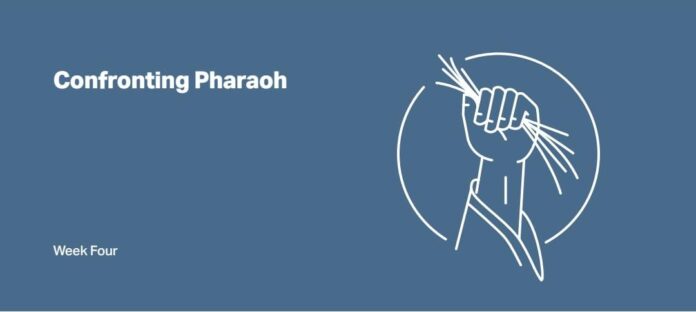The Book of Exodus | Week 04
Week’s Passage : Exodus 5,6
inTro
You Want Me Do What?
The passage highlights that before leading others, one must first align their own life with God’s commands. Moses experienced this when, on his way to obey God’s call to lead Israel, God confronted him with the intention to kill him, a surprising turn in the story. The issue was Moses’ failure to circumcise his son, a sign of God’s covenant. His wife, Zipporah, quickly corrected the situation by performing the circumcision, after which God spared Moses. This moment underscores that even small acts of obedience matter deeply to God, especially for those called to lead. God could not use Moses effectively while he neglected a known duty.
InGest
Let My People Go!
After fulfilling the covenant by circumcising his son, Moses met Aaron at the mountain of God. Together, they faced the daunting task of confronting Pharaoh, the ruler of the most powerful nation at the time to demand the release of the Israelite slaves. God instructed them to request a three-day journey into the wilderness to worship Him. Though some question the honesty of this request, Moses was following God’s exact command, possibly intended to soften Pharaoh’s resistance.
The real issue, however, wasn’t just about rest, it was about the Israelites’ right to worship God. Pharaoh, who believed himself divine and saw the Hebrew God as unknown and irrelevant, viewed the request with contempt. His defiant response, “Who is the Lord?” reflected not only disbelief but also a deeper struggle between divine authority and human power. Moses anticipated this resistance, knowing even his own people questioned God’s plan.
InTerpret
Things Get Worse.
Moses’ request for a three-day journey to worship God was reasonable, but Pharaoh’s harsh response revealed his hardened heart. He refused to let the Israelites go and made their labor even more difficult by withholding straw while demanding the same output. This intensified suffering led the Israelites to blame Moses, doubting that God was truly working through him.
Their reaction shows how people often misinterpret trials as signs of God’s absence. In reality, hardship can indicate that God is near and actively working for deliverance. Just as a mother’s labor pains increase before birth, increased suffering may precede breakthrough. This story reminds us that setbacks are part of following God, and resistance often means He is about to do something great.
InVite
Why Have You Forsaken Me?
In Exodus 5:22–23, Moses questioned God amid the suffering of the Israelites and the apparent failure of his mission. He felt discouraged and wondered if God was truly present. Similarly, Jesus experienced deep trials during critical moments in His life—such as in the wilderness, Gethsemane, and on the cross—when God seemed far away, yet was still near.
Despite severe temptations, betrayal, abandonment, and feelings of being forsaken, Jesus trusted in God’s presence. His experiences remind us that difficult circumstances do not mean God is absent. Even in our darkest moments, God is with us, working behind the scenes. We are called to trust Him, not judge His presence by our current struggles.
InSight
The Faithful in Egypt
During Israel’s slavery in Egypt, some remained faithful to God and prayed for deliverance, while others grew discouraged or adopted Egyptian ways. The Egyptians mocked their faith, questioning God’s power. Many Israelites hoped for freedom without suffering and were not ready to leave Egypt. God allowed hardship to reveal Pharaoh’s cruelty and to strengthen His people’s faith, so they would willingly choose to follow Him.
InQuire
- Why is God so particular about things we may consider insignificant, such as Moses’ failure to circumcise? (Exod. 4:24–26)
- How much courage did it require for Moses to confront the most powerful man in the world?
- Why do you think God had Moses ask only for time to make a three-day journey into the wilderness?
- Why do you think God allowed things to get harder for the Israelites after Moses obeyed His command to confront Pharaoh?
- Read Exodus 6:2–9. How does God respond to His people’s suffering? What promises does He make?



